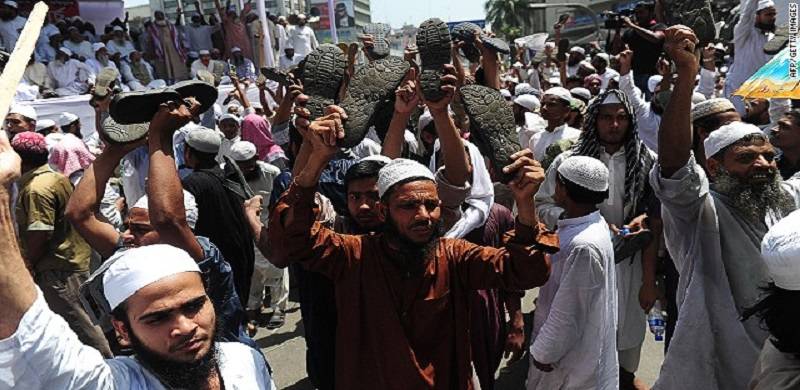
Lahore: The recent data by Centre for Social Justice (CSJ) shows that the abuse of blasphemy laws has increased exponentially in Pakistan. In its press release, the advocacy group noted: From 1987 to December 2020, at least 1855 persons have been alleged under the offences related to religion, mostly under Sections 295 B, C to 298 C, of the Pakistan Penal Code known as blasphemy laws.
The highest number of accused (200), were reported in the year 2020. 75% of accused were Muslims, while the largest number of victims (70%) belonged to the Shia sect, during this year. The others were Ahmadi 20%, Sunni 5%, and Christian 3.5%, Hindu 1% while religion of 0.5% was not confirmed.
The trend has changed from Muslims complainant accusing non-Muslims to Muslims bringing allegations against Muslims though it would be wrong to assume that any minority sect or religion identity had become immune to abuse. The trend is also indicative of deepening sectarian divide and rise of abuse of religion however faulty legislation is still a domicile's sword on the citizens of Pakistan.
In the cumulative picture, since 1987, the Punjab experienced the highest ratio of abuse of law and religion i.e. 76%, followed by 19% in Sindh. The prisons in Punjab housed 337 inmates in December 2020 which included under trial and convicted, Lahore district jail had the highest number of accused (60). At least 78 persons had been killed extra-judicially after allegations related to blasphemy and apostasy, 42 of whom were Muslims, 23 Christians, nine Ahmadis, two Hindus and two persons whose religious identity could not be ascertained. The data excludes the targeted killings of sects considered heretic or apostate, without leveling any allegations though the targeted killing may exceed hugely this number. It is true that killing of Hazara, Ahmadis and Shia is attributable to terrorism however the concept of blasphemy is frequently and openly used for fund raising, hate mongering and indoctrination to prepare cadres of the violent outfits.
Peter Jacob, the Executive Director of CSJ stated: “These statistics depict Pakistan as a place where abuse of blasphemy is highest in the world. The law is frequently used to inflict despicable and multiple human rights violations, including physical violence, losses of property and livelihood, evictions and even loss of life. It is not only the accused but some time the entire family and community which undergo the suffering after allegations are leveled. The government needs to pay serious attention to the drivers of religious intolerance.”
The highest number of accused (200), were reported in the year 2020. 75% of accused were Muslims, while the largest number of victims (70%) belonged to the Shia sect, during this year. The others were Ahmadi 20%, Sunni 5%, and Christian 3.5%, Hindu 1% while religion of 0.5% was not confirmed.
The trend has changed from Muslims complainant accusing non-Muslims to Muslims bringing allegations against Muslims though it would be wrong to assume that any minority sect or religion identity had become immune to abuse. The trend is also indicative of deepening sectarian divide and rise of abuse of religion however faulty legislation is still a domicile's sword on the citizens of Pakistan.
In the cumulative picture, since 1987, the Punjab experienced the highest ratio of abuse of law and religion i.e. 76%, followed by 19% in Sindh. The prisons in Punjab housed 337 inmates in December 2020 which included under trial and convicted, Lahore district jail had the highest number of accused (60). At least 78 persons had been killed extra-judicially after allegations related to blasphemy and apostasy, 42 of whom were Muslims, 23 Christians, nine Ahmadis, two Hindus and two persons whose religious identity could not be ascertained. The data excludes the targeted killings of sects considered heretic or apostate, without leveling any allegations though the targeted killing may exceed hugely this number. It is true that killing of Hazara, Ahmadis and Shia is attributable to terrorism however the concept of blasphemy is frequently and openly used for fund raising, hate mongering and indoctrination to prepare cadres of the violent outfits.
Peter Jacob, the Executive Director of CSJ stated: “These statistics depict Pakistan as a place where abuse of blasphemy is highest in the world. The law is frequently used to inflict despicable and multiple human rights violations, including physical violence, losses of property and livelihood, evictions and even loss of life. It is not only the accused but some time the entire family and community which undergo the suffering after allegations are leveled. The government needs to pay serious attention to the drivers of religious intolerance.”
